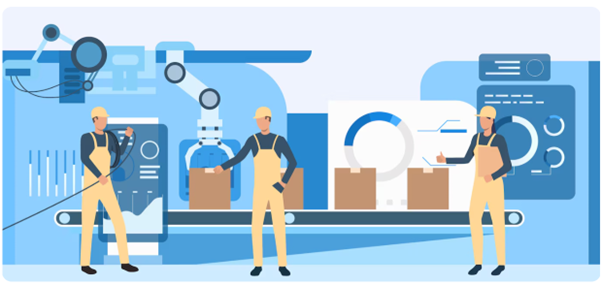Enhancing Workforce Productivity: The Role of Employee Management in Driving Success in Manufacturing Industries
.jpg)
In the fast-paced world of manufacturing, boosting productivity isn’t just a goal-it’s a necessity. Around the globe, disengaged employees are costing us nearly $8.8 trillion each year, which is about 9% of GDP (wikipedia.org, businessinsider.com, tmi.org). With these eye-opening numbers in mind, it’s clear that effective employee management is not just a nice-to-have, it’s a crucial factor for success in the industry.

The Evolution of Employee Management in Manufacturing
Gone are the days when paper logs and supervisor calls were the norm, today’s manufacturing landscape craves real-time visibility and accuracy. During the pandemic, companies that implemented real-time performance systems saw a remarkable boost in shop-floor efficiency-by as much as 30 to 50% in just 8 to 12 weeks (zimyo.com). This shift from merely reacting to proactively managing operations signifies a major transformation in how we govern our workforce.
The Importance of a Robust Employee Onboarding Process
Picture this: new hires only hitting 25% of their productivity in their first month (flair.HR). Almost two-thirds of organizations find it tough to provide effective onboarding, with a staggering 88% falling short of expectations (flair.HR). To make matters worse, inadequate onboarding can double the chances of early departures. In the manufacturing sector, where precision and timeliness are crucial, these statistics aren’t just numbers-they represent real obstacles.
Digital HRMS Modules: A Game Changer
Integrated Digital HRMS modules are revolutionizing the onboarding experience. According to the Society for Human Resource Management, companies using HRMS see onboarding speeds increase by 22%, leading to a 30% boost in retention within the first 90 days (piscosmart.net). Gartner also notes that new hires experience a 28% increase in productivity during their first month, thanks to real-time workflows (piscosmart.net). These aren’t just small improvements-they’re game changers.
Optimizing Induction Through Digital HRMS
AI-powered onboarding tools are saving HR teams valuable time. For instance, Hitachi managed to cut onboarding delays by 4 days and reduced the time HR spends per hire from 20 hours to just 12 (businessinsider.com). In manufacturing, where induction must juggle safety, machinery training, and compliance, this kind of efficiency is nothing short of revolutionary.
Day-to-Day Employee Management Made Efficient
Manufacturing relies on well-structured shifts and consistent output. With Digital HRMS, biometric attendance seamlessly integrates with task allocation dashboards. The outcome? Better role alignment, less idle time, and automated leave management. This level of precision guarantees that the right person is in the right spot at the right time-and all of it is digitally tracked.
The Measurable Impact on Workforce Productivity
Having a solid onboarding system can lead to an impressive 82% boost in employee retention and a 70% increase in productivity (piscosmart.net). For instance, IBM managed to cut onboarding time by a whopping 75%, which in turn raised first-year productivity by 25% (psico-smart.com). Similarly, Amazon trimmed down the ramp-up time for new associates by 20% through a structured 30-day induction program (psico-smart.com). In manufacturing, similar strategies can often result in productivity gains of 30% to 50% in just a matter of weeks (zimyo.com).
The issue of skill gaps in manufacturing is still pressing: a recent survey by the Australian HR Institute found that nearly 60% of employers are experiencing productivity losses due to skill shortages, and 32% of organizations face an annual turnover rate of 20% or more (theaustralian.com.au). However, with effective training and onboarding, companies can significantly reduce ramp-up time, lower attrition rates, and see a surge in productivity.
Future Proofing Manufacturing with Smart HR Software
As the manufacturing sector shifts towards Industry 4.0, it’s crucial for HR management systems (HRMS) to keep pace. Cloud-based, AI-driven, and modular solutions enable HR teams to create customized workflows, compliance documents, and analytics. This transformation allows HR to evolve from a mere administrative function to a strategic partner in growth-focusing on managing trajectories instead of just timesheets.
To Wrap it Up
Managing employees isn’t just a superficial aspect of factory operations, it’s a critical lever for success. Automated HRMS software, which includes features like employee onboarding, induction, and shift planning, has been shown to increase new-hire productivity by 28%, reduce HR hours, enhance retention rates by up to 82%, and boost overall productivity by as much as 70%. In the manufacturing world, where every minute and output matters, investing in digital employee management is not just a choice-it’s a necessity.
Ready to revolutionize your manufacturing workforce management?
Streamline onboarding, optimize operations, and enhance productivity with Digital HRMS. Schedule a free demo today!